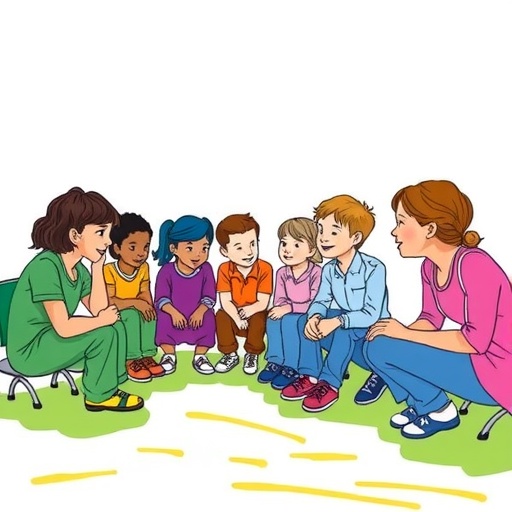In a groundbreaking study published in BMC Psychiatry in November 2025, researchers have peeled back the layers of youth mental health service experiences through the YouthCan IMPACT initiative, shedding crucial light on how integrated community-based mental health care compares to traditional hospital-based psychiatric services. This pioneering qualitative investigation provides unprecedented insights into the intricate dynamics of youth mental health services, highlighting the profound impact of dignity, respect, and autonomy in care outcomes.
Mental health and substance use (MHSU) disorders affect approximately 20% of Canadian youth aged 12 to 25, with a significant proportion failing to access timely, evidence-based care. The YouthCan IMPACT project sought to address this disconnect by implementing a pragmatic randomized controlled trial (pRCT) comparing two distinct models: integrated collaborative care teams within community settings versus conventional youth outpatient hospital psychiatric services. What sets this study apart is its embedded qualitative component, which focused on capturing youth participants’ subjective perceptions and lived experiences within both care contexts.
Between 2018 and 2019, researchers conducted semi-structured interviews with 44 adolescent participants aged 14 to 17, extracted from an ongoing pRCT cohort. Equal participants came from the intervention group receiving integrated community care and the control group receiving hospital-based services. This purposive sampling strategy, stratified by sex assigned at birth and study arm, ensured a comprehensive evaluation across diverse individual trajectories. The dual thematic analysis by independent coders allowed for nuanced comparisons of experiential quality within each care model, emphasizing youth voice in shaping conclusions.
The study’s findings underscore the centrality of fundamental human values—dignity, respect, and autonomy—in the therapeutic relationship and overall service satisfaction. Participants from both groups highlighted that being treated as individuals with unique needs, receiving consistent and tailored services, and having access to comprehensive, transparent information profoundly influenced their care experience. When youth felt empowered to collaborate actively with providers in formulating their treatment plans, service utility and mental health improvement rates increased significantly.
Strikingly, youth receiving hospital-based psychiatric services reported notable challenges including encounters with inappropriate or misaligned care practices, inefficiencies in service delivery, and fragmented coordination between providers. These negative experiences often eroded core principles of respect and autonomy, leading to diminished satisfaction and potentially poorer health outcomes. In contrast, the integrated community-based model fostered supportive environments where youth felt genuinely heard and involved, promoting enhanced engagement and perceived efficacy.
This embedded qualitative investigation is a global first within the context of pRCTs evaluating integrated collaborative care for youth MHSU conditions. By delving deeply into experiential domains rarely quantified in clinical trials, the study enriches the evidence base surrounding how youth perceive and interact with distinct mental health systems. It illuminates critical gaps and opportunities in standard hospital care that may contribute to treatment disparities and unmet needs among vulnerable youth populations.
The implications of these findings extend beyond academic discourse, urging health system planners and policymakers to prioritize service delivery models that are youth-centric, emphasizing respect, personalized engagement, and partnership in care decision-making. Community-based collaborative teams represent a promising avenue for shrinking the treatment gap that has long hampered effective intervention for young people contending with MHSU challenges.
Moreover, the application of rigorous qualitative methodologies within a controlled trial framework represents an advance in mental health research paradigms. This approach captures the complex, often intangible aspects influencing therapeutic success, which traditional quantitative metrics may overlook. It champions the integration of youth voices as crucial contributors to service evaluation, design, and continuous quality improvement.
As the burden of youth mental health continues to rise globally, innovative and inclusive approaches to care are urgently needed. This study offers compelling evidence that transitioning away from predominantly hospital-centered psychiatric models towards integrated community care holds transformative potential. By fostering environments steeped in dignity, respect, and autonomy, mental health services can better facilitate recovery trajectories and long-term wellbeing for young people.
In conclusion, the YouthCan IMPACT qualitative analysis represents a seminal contribution to youth mental health literature, underscoring that how services are delivered can be as critical as the care modalities themselves. The experiences recounted by youth reveal that collaborative, community-rooted services not only resonate more deeply but may also enhance clinical outcomes. Future research and policy must heed these insights to cultivate mental health systems responsive to the complex realities faced by youth today.
This comprehensive study crystallizes a paradigm shift in youth mental health care conceptualization, advocating for models that empower young people, honor their lived experiences, and integrate multidisciplinary support in accessible, community-based settings. Through the lens of dignity, respect, and autonomy, the path toward more effective mental health interventions for youth becomes clearer and achievable.
Subject of Research: Youth experiences of hospital- and community-based mental health services within the context of an integrated collaborative care model.
Article Title: A qualitative study exploring youth’s experiences of hospital- and integrated community-based mental health services: the YouthCan IMPACT initiative.
Article References: Quinlan-Davidson, M., Henderson, J.L., Szatmari, P. et al. A qualitative study exploring youth’s experiences of hospital- and integrated community-based mental health services: the YouthCan IMPACT initiative. BMC Psychiatry 25, 1084 (2025). https://doi.org/10.1186/s12888-025-07523-7
Image Credits: AI Generated
DOI: 10.1186/s12888-025-07523-7




